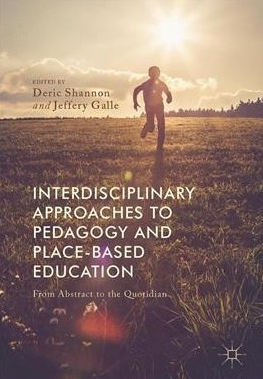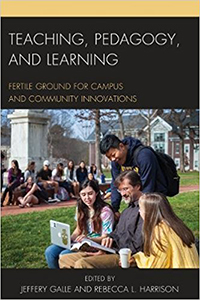Oxford's Center for Academic Excellence inspires 3 new books

Three recently completed books have emerged from Oxford's Center for Academic Excellence (CAE).
Three recently completed books have emerged from Oxford's Center for Academic Excellence (CAE). Two books developed from the center's annual Institute for Pedagogy in the Liberal Arts (IPLA) program, which draws scholars of teaching and learning from the college and across the region. The other book originated from CAE-related conversations between Jeffery Galle, Oxford CAE director and associate professor of English, and Deric Shannon, assistant professor of sociology.
The CAE, a resource for Oxford College faculty development, hosts IPLA each year. Faculty from a wide array of institutions gather on the Oxford campus for this four-day professional development conference. Frequently, Oxford faculty lead IPLA sessions as Deric Shannon did recently when one of the three book ideas was born.
“The vision of IPLA is to provide venues for rich conversations and discoveries that lead to innovation in teaching both in individual courses and in programs at the college level,” Galle says.
A new take on place-based education

Traditional place-based education typically connects to outdoor education, travel courses, and courses on sustainability. “Our authors take this formulation and creatively expand on it,” Shannon says.
The book includes the work of scholars of psychology, environmental science, literature, and sociology who engage with place as an organizing principle for teaching.
“Many do so in creative ways, including looking at digital ecosystems as place, remaining in the classroom to explore place, teaching on college farms, and travel courses,” Shannon adds.
With a scheduled release in late June by Palgrave Macmillan, the book contains essays by the following Oxford contributors: Matthew Moyle, assistant professor of French; Patricia Owen-Smith, professor of psychology and women's studies; and co-authors Jill Petersen Adams, director of experiential learning, and Molly McGehee, associate professor of American studies. Shannon and Galle contributed individual chapters and co-edited the book, with Shannon as the lead author.
Place structures all of his work, Shannon says. His students learn about the area through Oxford’s Theory Practice/Service Learning classes. They spend class time on the Oxford Organic Farm and work closely with farmer and educator Daniel Parson.
“My students rave about their experiences learning from the communities in which they work,” Shannon says. “They get a feel for the community and social ecosystems in which they’re temporarily embedded while they’re at Oxford.”
Encouraging campus innovations
The possibility of writing an IPLA-related book wasn’t a new concept. IPLA participant Rebecca Harrison, associate professor of English and director of STEAM English at the University of West Georgia, acted upon the idea by inquiring about writing a proposal together with Galle. In 2015, the duo invited previous IPLA participants to contribute potential chapters to the book.
After their publisher suggested reorganizing the essays, they produced two books of about 200 pages each. Teaching, Pedagogy, and Learning: Fertile Ground for Campus and Community Innovations is the first of these two books, published in May just before IPLA 2017 began.

The second book launched out of the IPLA experience, Revitalizing Classrooms: Innovations and Inquiry Pedagogies in Practice is slated for August. The second book includes a group of essays written by individual faculty who developed undergraduate research through student inquiry, as well as other innovations in their courses. Galle and Harrison contributed individual chapters and co-edited both books, with Galle as the lead author.
The publication of these books helps the focus of IPLA come full circle.
“These two books complete the scholarly circle from exploration, to experimentation, to publication,” Galle says. “They substantiate the claim that Oxford College and the institute offer serious support for the scholarship of teaching and learning.”
Galle adds: “All three books represent collaborative efforts that joined the talents and interests of faculty with scholarly support from the Center for Academic Excellence.”
Learn more about the CAE.
Three recently completed books have emerged from Oxford's Center for Academic Excellence (CAE). Two books developed from the center's annual Institute for Pedagogy in the Liberal Arts (IPLA) program, which draws scholars of teaching and learning from the college and across the region. The other book originated from CAE-related conversations between Jeffery Galle, Oxford CAE director and associate professor of English, and Deric Shannon, assistant professor of sociology.
The CAE, a resource for Oxford College faculty development, hosts IPLA each year. Faculty from a wide array of institutions gather on the Oxford campus for this four-day professional development conference. Frequently, Oxford faculty lead IPLA sessions as Deric Shannon did recently when one of the three book ideas was born.
“The vision of IPLA is to provide venues for rich conversations and discoveries that lead to innovation in teaching both in individual courses and in programs at the college level,” Galle says.
A new take on place-based education
 When Shannon led a session on place-based pedagogy at IPLA, a book idea started. He and Galle began discussing the central role that place might have across the disciplines and decided to put a book together to look at this concept. Interdisciplinary Approaches to Pedagogy and Place-Based Education: From the Abstract to the Quotidian resulted from their efforts.
When Shannon led a session on place-based pedagogy at IPLA, a book idea started. He and Galle began discussing the central role that place might have across the disciplines and decided to put a book together to look at this concept. Interdisciplinary Approaches to Pedagogy and Place-Based Education: From the Abstract to the Quotidian resulted from their efforts.
Traditional place-based education typically connects to outdoor education, travel courses, and courses on sustainability. “Our authors take this formulation and creatively expand on it,” Shannon says.
The book includes the work of scholars of psychology, environmental science, literature, and sociology who engage with place as an organizing principle for teaching.
“Many do so in creative ways, including looking at digital ecosystems as place, remaining in the classroom to explore place, teaching on college farms, and travel courses,” Shannon adds.
With a scheduled release in late June by Palgrave Macmillan, the book contains essays by the following Oxford contributors: Matthew Moyle, assistant professor of French; Patricia Owen-Smith, professor of psychology and women's studies; and co-authors Jill Petersen Adams, director of experiential learning, and Molly McGehee, associate professor of American studies. Shannon and Galle contributed individual chapters and co-edited the book, with Shannon as the lead author.
Place structures all of his work, Shannon says. His students learn about the area through Oxford’s Theory Practice/Service Learning classes. They spend class time on the Oxford Organic Farm and work closely with farmer and educator Daniel Parson.
“My students rave about their experiences learning from the communities in which they work,” Shannon says. “They get a feel for the community and social ecosystems in which they’re temporarily embedded while they’re at Oxford.”
Encouraging campus innovations
The possibility of writing an IPLA-related book wasn’t a new concept. IPLA participant Rebecca Harrison, associate professor of English and director of STEAM English at the University of West Georgia, acted upon the idea by inquiring about writing a proposal together with Galle. In 2015, the duo invited previous IPLA participants to contribute potential chapters to the book.
After their publisher suggested reorganizing the essays, they produced two books of about 200 pages each. Teaching, Pedagogy, and Learning: Fertile Ground for Campus and Community Innovations is the first of these two books, published in May just before IPLA 2017 began.
 Teaching, Pedagogy, and Learning, published by Rowman & Littlefield, contains seven essays covering topics across 11 academic disciplines ranging from biology to political science. The book offers a unique approach to pioneering instruction that aims to engage student inquiry and question-making while boosting faculty teaching effectiveness and satisfaction. The essays in this first book focus primarily on innovations at the program level.
Teaching, Pedagogy, and Learning, published by Rowman & Littlefield, contains seven essays covering topics across 11 academic disciplines ranging from biology to political science. The book offers a unique approach to pioneering instruction that aims to engage student inquiry and question-making while boosting faculty teaching effectiveness and satisfaction. The essays in this first book focus primarily on innovations at the program level.
The second book launched out of the IPLA experience, Revitalizing Classrooms: Innovations and Inquiry Pedagogies in Practice is slated for August. The second book includes a group of essays written by individual faculty who developed undergraduate research through student inquiry, as well as other innovations in their courses. Galle and Harrison contributed individual chapters and co-edited both books, with Galle as the lead author.
The publication of these books helps the focus of IPLA come full circle.
“These two books complete the scholarly circle from exploration, to experimentation, to publication,” Galle says. “They substantiate the claim that Oxford College and the institute offer serious support for the scholarship of teaching and learning.”
Galle adds: “All three books represent collaborative efforts that joined the talents and interests of faculty with scholarly support from the Center for Academic Excellence.”
Learn more about the CAE.